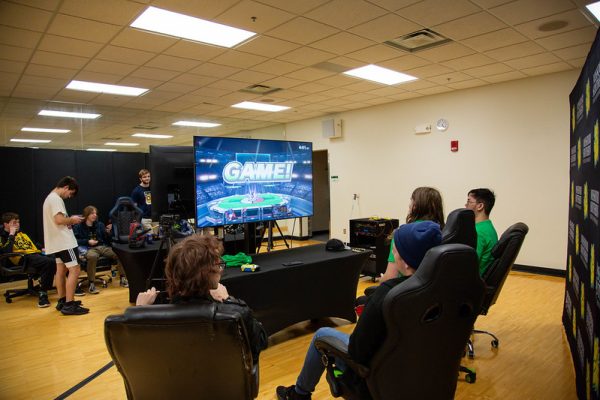Minimum wage increase dips into university budget

Minimum Wage Increase Graphic
The passing of Proposition B in the November 2018 election means an increase in income for student workers this semester at Missouri Southern.
With its approval, voters raised Missouri’s minimum wage from $7.85 to $8.60 per hour. The effect, which began on Jan. 1, will increase the pay rate incrementally during the next five years. By 2023 the state’s minimum wage will rise to $12 per hour.
Missouri Southern’s budget for the 2018-19 fiscal year was set on July 1, 2018, according to Darren Fullerton, Vice President of Academic Affairs. Thus the wage increase was not considered when the budget was developed.
The increase this spring means the student employee funds will require $38,000 to be drawn from a contingency fund to complete this fiscal year, explained Fullerton, adding if the budget is not adjusted to compensate for the increase, by the end of the five-year period, the student raises will add up to $500,000.
Current student workers who were making the minimum rate will now receive $8.60/hour. Any student making more than $8.60/hour will remain at their current pay rate.
To mitigate the difference, a University committee is reviewing all of the student employee positions.
Fullerton said this is considered a “compression issues” and is one of the factors the new committee will review this semester.
The committee will also take into consideration the number of student employees. While the number fluctuates, Fullerton said there are approximately 350 per school year.
“No one’s been identified or targeted or anything at this point,” Fullerton said. “That’s what the committee will look at this semester.
“[We will] see how many regular student employees that pretty much work the whole school semester.”
Fullerton said the committee will examine how many student workers are seasonal, work short periods of time, or work on specific projects.
The goal, he said, is to get a good handle on all aspects of student employment, to do our best to make it as beneficial as possible.”
As of now, Fullerton said, no position had been eliminated, but the possibility exists based upon the committee findings.
The committee, comprised of faculty and staff, will have cross-representation from the campus. He said students with ideas about the budget may contact Glenda O’Dell, student employee coordinator.
Once several aspects of student employment is assessed, the committee will add student representation.
Fullerton said Student Senate members will likely act as student members of the committee, because they are elected to represent students.
“That way it’s not one particular area gets [represented] versus another,” Fullerton said. “We know that student employment in valuable, not only for the University but definitely for the students.”
Fullerton said students not only gain funds to assist their schooling, but also gain skills which are transferable to full time jobs post graduation.
“It gives [students] an opportunity to work in professional settings,” Fullerton said. “We know that student employment [is] very valuable to the University as whole.”
Your donation will support the student journalists of Missouri Southern State University. Your contribution will allow us to purchase equipment and cover our annual website hosting costs.
































